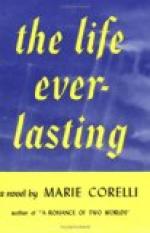“You secured honours with the husks,” said Mr. Harland.
Santoris gave a gesture of airy contempt.
“Honours! Such honours! Any fellow unaddicted to drinking, with a fair amount of determined plod could win them. The alleged ‘difficulties’ in the way are perfectly childish. They scarcely deserve to be called the pothooks and hangers of an education. I always got my work done in two or three hours—the rest of my time at college was pure leisure,—which I employed in other and wiser forms of study than those of the general curriculum—as you know.”
“You mean occult mysteries and things of that sort?”
“‘Occult’ is a word of such new coinage that it is not found in many dictionaries,”—said Santoris, with a mirthful look—“You will not find it, for instance, in the earlier editions of Stormonth’s reliable compendium. I do not care for it myself; I prefer to say ‘Spiritual science.’”
“You believe in that?” asked Catherine, abruptly.
“Assuredly! How can I do otherwise, seeing that it is the Key to the Soul of Nature?” “That’s too deep for me!” said Dr. Brayle, pouring himself out a glass of whisky and mixing it with soda-water—“If it’s a riddle I give it up!”
Santoris was silent. There was a moment’s pause. Then Catherine leaned forward across the table, looking at him with tired, questioning eyes.
“Could you not explain?” she murmured.
“Easily!” he answered—“Anyone can understand it with a little attention. What I mean is this,—you know that the human body outwardly expresses its inward condition of health, mentality and spirituality—well, in exactly the same way Nature, in her countless varying presentations of beauty and wisdom, expresses the Soul of herself, or the spiritual force which supports her existence. ‘Spiritual science’ is the knowledge, not of the outward effect so much as of the inward cause which makes the effect manifest. It is a knowledge which can be applied to the individual daily uses of life,—the more it is studied, the more reward it bestows, and the smallest portion of it thoroughly mastered, is bound to lead to some discovery, simple or complex, which lifts the immortal part of a man a step higher on the way it should go.”
“You are satisfied with your researches, then?” asked Mr. Harland.
Santoris smiled gravely.
“Do I look like a man that has failed?” he answered.
Mr. Harland studied his handsome face and figure with ill-concealed envy.
“You went abroad from Oxford?” he queried.
“Yes. I went back to the old home in Egypt—the house where I was born and bred. It had been well kept and cared for by the faithful servant to whom my father had entrusted it—as well kept as a Royal Chamber in the Pyramids with the funeral offerings untouched and a perpetual lamp burning. It was the best of all possible places in which to continue my particular line of work without interruption— and I have stayed there most of the time, only coming away, as now, when necessary for a change and a look at the world as the world lives in these days.”




